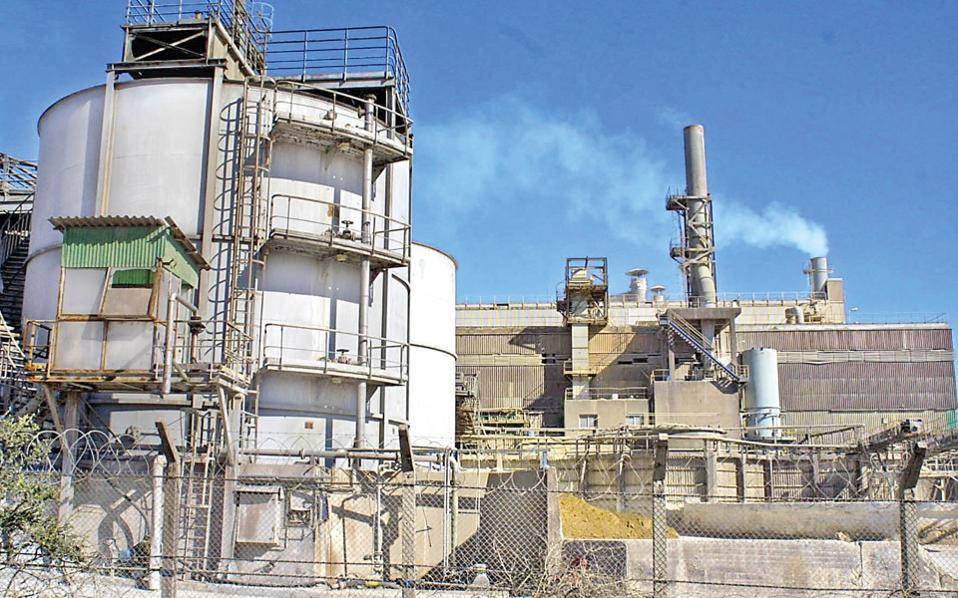Among the promises that propelled leftist SYRIZA to power two years ago was a commitment to revive domestic industry. Even after the government signed Greece’s third bailout agreement in the summer of 2015, the promises kept coming thick and fast. The deputy industry minister at the time, Theodora Tzakri, even drafted a plan for the industrial revival that foresaw the return to operation of 166 shuttered factories.
Two years on, the record of the SYRIZA-Independent Greeks coalition in industry is negligible at best. According to 2016 data from the Labor Ministry’s Ergani database for employment, four of the five activities with the most negative net employment balance in the past year have been in the industrial sector: the food industry, mining and quarrying, specialized construction activities, and non-mineral product manufacturing.
Among the cases that the government cited – and invested heavily from a communications standpoint – was Shelman wood product manufacturer, United Textiles and Hellenic Fertilizers (ELFE). In all these cases, the harsh reality remains far removed from the government’s promises.
United Textiles has been bankrupt since 2012. The company’s resurrection faced a number of legal and financial obstacles, yet this did not prevent Prime Minister Alexis Tsipras’s government from announcing in July 2015 that four units, in Komotini and Noussa in northern Greece, would be back in operation that autumn. This deadline, of course, was missed but the government did not give up and on December 30, 2015, it issued a legislative act suspending the liquidation of the company’s assets for another six months.
Any hopes that remain of the United Textiles factories ever operating again rest on abandoning the plan to bring the company back to life and finding a new investor to buy its assets. According to Yiannis Mousoulidis, the company’s last CEO before it went bankrupt, the Luxembourg-based Aiglon investment fund has already surveyed 65 percent of the company’s facilities. “As soon as that process is completed and it has assessed the company’s assets, it will submit an investment proposal within two weeks.”
Mousoulidis said “a written commitment to the council of creditors” already exists to this effect, while adding that the fund (which also consists of Greeks) will fully implement the operational plan he and other former employees have drafted.
This remains to be seen, however, as there is also the issue of a European Commission ruling according to which the Greek state must recoup 30 million euros in illegal state subsidies given to the company.
The case of Shelman, which went under in April 2014, is proving equally thorny. Its plant in Komotini has been managed for the past year by a group of former workers (there were more than 90 before it shut down). “We guard the facility and take care of the necessary maintenance,” says Nikos Alexandridis, the head of the workers’ group. In October 2015, the bankruptcy court ruled that the factory could be auctioned off after a Greek investor expressed interest.
The evaluation of the Komotini facility took six months and was completed in March 2016, settling on a value of 11-12 million euros. The preparation of the public auction took an additional eight months.
“It took judges four months to approve the decision by the council of creditors to put the factory up for auction,” says Giorgos Kymparidis, head of the Rodopi Bar Association and the workers’ legal representative. “When it was eventually issued it was the middle of summer and we had to wait until September to get things moving again.”
According to Kymparidis, beyond the first potential investor, others have shown an interest in the facility. This has failed to materialize, however, in consecutive weekly auctions held since early December.
Explosive chemistry
ELFE, meanwhile, is steeped in controversy and tension. Nikos Vogiatzidis, who represents 180 sacked workers, tells Kathimerini that businessman Lavrentis Lavrentiadis, who took control of the company in 2009, transferred all its operations to two new companies in 2015, leaving to ELFE only its massive debts. Then, last March, says Vogiatzidis, “we [the workers] were asked to sign a buyout agreement – the compensation was one month’s salary plus 1,000 euros to be paid in installments – with the possibility of being rehired at the new companies on individual 14-month contracts.”
Vogiatzidis said that those who refused to sign were sued by the company for a number of reasons, including sabotage of company property. After the suits were filed, “we were fired without compensation and without the ability to claim unemployment benefits,” he claims.
Those who signed the buyout agreement are on fixed-term contracts (there are more than 400 now) and in open confrontation with the sacked workers. Meanwhile, on December 30, production was transferred to yet another new company, called Nea Karvali Fertilizers.
Following months of unrealistic promises from the government, the Labor Ministry is expected next week to send the agency responsible for the Nea Karvali Fertilizers plant’s operating license (the Regional Authority of Eastern Macedonia and Thrace) a scathing report on safety violations found at the unit. This report looms as yet another bump in the course of the company’s turbulent history.
source: ekathimerini.com, Yannis Palaiologos

